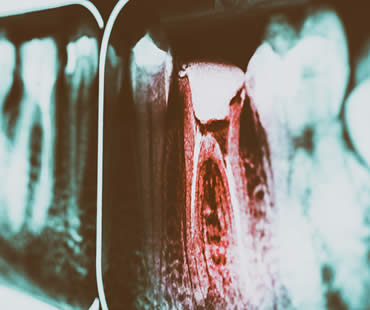
by Dr. Adkins | Sep 20, 2019 | Blog, Dental Topics 2, Root Canal Treatment
Root canal treatments are specifically designed to relieve the tooth pain associated with an infected tooth root. Patients come in with pain, and often leave the procedure with less discomfort than before. However, if you’ve recently had a root canal treatment on one or more of your teeth, you might be experiencing discomfort following the procedure. Fortunately, there are things you can do at home to take care of it.
Are your gums sore, tender or swollen surrounding the affected tooth? This is likely the result of the tiny metal clips that affix a rubber dam around the tooth, protecting it and protecting your mouth. The clips are attached along the gum line, and can leave tiny bruises or sometimes small cuts in the soft gum tissue. This pain should alleviate within two days of the treatment.
Is the tooth itself sore? This is a common occurrence and is typically the result of an inflammation of the mouth tissues that encase the tooth root. The tools used by the endodontist to perform the procedure can irritate the tissues.
Both of these types of pain can be dealt with by several over-the-counter analgesics. The ones that are most recommended to treat dental pain are those that possess anti-inflammatory agents: naproxen sodium, ibuprofen or aspirin, etc. If you are also taking narcotics prescribed by your dentist, do not take any further medication, over-the-counter or prescription, until you have checked with your dentist. Dangerous reactions can occur.
If you have been prescribed antibiotics, do not stop until you have completed each recommended dose. This ensures that your tooth remains free of infection and can heal thoroughly.
Ask your endodontist if you have other concerns about treating your post-root canal treatment pain.
We look forward to seeing you in our McDonough dental office

by Dr. Adkins | Aug 23, 2019 | Blog, Dental Topics 2, Root Canal Treatment
The desire for a beautiful, healthy, natural smile is universal. Dental procedures such as root canal treatments aren’t something people aspire to have, and there are things you can do personally that can reduce your risk of having a root canal procedure.
Prevention is the best step you can take to avoid root canal therapy, and it all begins with you at home. If you didn’t grow up with good oral hygiene habits, now is the time to develop them. This simple step can lead directly to good oral health. Be sure you are brushing your teeth at least twice a day, following each meal if possible, and absolutely before sleeping. If you don’t brush your teeth before bedtime, you’re providing a robust breeding ground for bacteria to grow and degrade your teeth while you’re sleeping. Floss daily to reach the places between teeth and beneath the gum line that brushing can’t reach.
Fluoride in your toothpaste and in mouthwash can keep your tooth enamel strong and durable. Never give fluoridated toothpastes to children under the age of two years and avoid fluoridated mouthwash until the child is more than six years old.
Maintaining a proper diet ensures that your body is receiving all of the nutrients it needs for health, both orally and elsewhere in the body. Chewing crunchy foods like raw vegetables and hard fruits can help keep your teeth bright and clean, scraping away debris while you chew.
If you are a smoker, you should stop immediately. Not only is it a huge factor in your oral health, but also for your overall health. Smoking contributes directly to lung disease, cancer and heart disease, as well as other health issues. Your dentist or doctor can give you excellent advice about quitting.
Stay hydrated by drinking lots of water and avoiding sugared drinks. Rinse your mouth after consuming soda, coffee, tea or a sports drink.
Be sure to see your dentist twice a year for regular check-ups and cleanings, and keep your risk of a root canal treatment low.
Schedule your appointment at our McDonough dental office

by Dr. Adkins | Jul 12, 2019 | Blog, Dental Topics 1, Root Canal Treatment
If you have tooth pain or another issue, you might wonder what a visit to the dentist may reveal. You may need a root canal procedure. In order to properly evaluate your issue and to confirm the need for a procedure, a dentist will examine several factors. These typically include the symptoms you are experiencing, the signs observed, and any additional testing required to confirm an initial theory.
You may have noticed:
- You experience average to severe pain that lingers, during or immediately after drinking hot liquids or food, or very cold liquids or foods.
- You have pain, swelling, or sensitivity when biting or chewing on a certain tooth.
- Your tooth pain disrupts your life, preventing you from sleeping through the night or conducting your daily business without taking an over-the-counter pain reliever.
- You have a “bubble” on your gum, similar to a pimple. When irritated, it may release blood or pus that can smell or taste bad.
- You have pain that radiates out from one tooth to other areas of your head or jaw. For example, a tooth pain can lead to a pain behind the eye like a headache or to the ear, resulting in earache symptoms.
- You have a discolored tooth that is darker than the surrounding teeth. A grey tooth can indicate a “dead” tooth.
- You have a broken or cracked tooth with obvious signs of damage or decay.
Your dentist may have noticed:
- A tooth problem revealed by x-rays
- A recurring or persistent gum pimple (also called “fistulous tracts”)
- A tooth that has changed color
Additional testing:
- X-ray examination – if x-rays did not reveal the problem, they can provide an extremely clear picture of tooth health
- Percussion testing – a gentle tapping on the teeth to evaluate pain response
- Thermal testing – a careful application of a hot or cold stimulus to evaluate sensitivity
Sometimes, teeth needing to undergo a root canal procedure have no symptoms discernible to the patient. It is important to visit your dentist regularly to ensure the proper diagnosis and treatment needed to maintain life-long oral health.
If you need root canal treatment in the McDonough area, contact our office today to schedule a consultation.

by Dr. Adkins | Jun 28, 2019 | Blog, Dental Topics 2, Root Canal Treatment
If you are dealing with ongoing tooth pain, you may be too fearful to go to the dentist to find out what’s going on. It’s important that you do, however, as you may need root canal therapy. Your dentist will need to evaluate you to see if that procedure is necessary, and will closely examine several factors: the signs the dentist can see personally, the results of any tests performed during your visit, and the symptoms you have been experiencing with the problematic tooth.
Your dentist may observe:
- A tooth that is discolored
- X-rays that reveal a tooth problem
- A fistulous tract, or persistent or recurring gum pimple
Additional testing done by your dentist:
- X-rays provide an extremely clear picture of the health of the tooth
- Thermal testing can evaluate sensitivity through a careful application of hot or cold temperatures
- Percussion testing evaluates pain response through gentle tapping
You may have been noticing:
- A broken or cracked tooth obviously decayed or damaged
- A discolored tooth, especially a grey tooth
- A “bubble” in your gums, like a pimple. It may or may not have ruptured, leaking pus that smells or tastes awful
- Pain that shoots out from one tooth to your jaw or ear, leading to earache symptoms
- Pain that prevents you from living your life without painkillers
- Pain, sensitivity or swelling on one certain tooth
- Extreme sensitivity to hot or cold liquids that lingers and is very painful
In some cases, an infected tooth that requires a root canal treatment has no symptoms at all that could be discerned by you. Only a dental professional can confirm the need to undergo root canal therapies. If you are experiencing pain that disrupts your life, talk to your dentist or endodontist immediately. Root canal treatments are designed to relieve the pain you’re experiencing now and to restore your tooth to full form and function. Don’t wait to get your life and smile back!
Our dental office is located in McDonough

by Dr. Adkins | Jun 14, 2019 | Blog, Dental Topics 2, Root Canal Treatment
If you suspect you have an infected tooth, you might wonder if root canal treatment might be in your future. Do you have another option? Yes! One such alternative has been in existence for decades, but has only recently come to be more effective due to advancements in materials. This process is called pulp capping.
Pulp capping can help patients whose root infections have not yet reached the tooth’s nerve. Root infections begin when bacteria enters the pulp of the tooth through a crack or a large cavity. In a standard root canal procedure, the pulp and nerve of the tooth is hollowed out, cleaned and sealed, typically with a crown restoration.
With pulp capping, the nerve is preserved and the tooth is often repaired with a filling instead of a crown. Pulp capping allows the dentist to clean and protect the pulp, defending it from infection with medicine. With a successful pulp cap, the dentin of the tooth begins to regrow over the pulp cap. Advancements in the sealants used during these types of procedures has allowed for a greater percentage of success.
If you have a toothache, it’s important to see your dentist immediately. Pulp capping has a narrow window in which it can be performed. If your tooth is too infected, the pulp and nerve of your tooth may already be infected, and it’s too late for pulp capping to be effective.
A pulp cap is a far less invasive procedure than a root canal treatment or a tooth extraction, and there is less recovery time and tooth sensitivity following the treatment.
If you suspect you may have a tooth in trouble, talk to your dentist now. You might be able to save yourself a root canal treatment.
Our dental office is located in McDonough

by Dr. Adkins | May 3, 2019 | Blog, Dental Topics 1, Root Canal Treatment
Endodontics is a dental term often linked to a more common dental procedure you’ve probably already heard of called root canal treatment. Endodontics focuses on the pulp of your tooth, which holds nerves and blood vessels supplying nutrients and oxygen to your tooth. When the pulp is infected or injured, endodontic treatment may be performed to save the tooth.
During endodontic treatment, the hollow part inside your tooth is cleaned, disinfected, and filled. It is often the best way to save a tooth that has been damaged by decay, trauma, or other causes. Common symptoms that endodontic treatment is necessary include pain, tooth sensitivity, or exposure of the pulp due to tooth fracture.
After examining your tooth and X-ray results, your dentist will recommend the kind of endodontic treatment you need based on how seriously the pulp is impacted. One type is called vital pulp therapy, which has a goal of preserving and protecting your tooth’s pulp. This procedure involves removing only the pulp from the crown of your tooth and not from the root. It is only advised when there is no swelling or abscess present, and the tooth is secure.
Another type of endodontic treatment is non-vital pulp therapy, which is known as root canal treatment. It is performed when there is no chance of saving the pulp of your tooth. The whole pulp will be removed from inside your tooth, and the canals will be cleaned and filled with a special material. Then a stainless steel crown will be placed on the tooth.
Sometimes endodontic treatment is not recommended, and the tooth needs to be extracted instead. This choice depends on factors such as tooth location, age of the tooth, extent of damage, and the patient’s overall health. Your dentist will be able to advise you on the best treatment for your condition.
Schedule your appointment at our McDonough dental office








 770-957-5214
770-957-5214  E-Mail Us
E-Mail Us 
